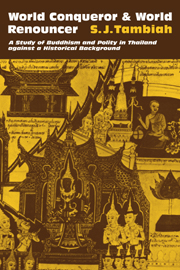 World Conqueror and World Renouncer
World Conqueror and World Renouncer Book contents
- Frontmatter
- Contents
- Acknowledgments
- PART ONE
- PART TWO
- 13 The Composition and Distribution of Religious Personnel: What the Figures Say
- 14 Monkhood as an Avenue of Social Mobility
- 15 Monastic Careers and Monastic Network
- 16 Patronage of the Sangha and the Legitimation of the Polity
- 17 Reformism and Ideological Transformation Based on Tradition
- 18 Missionary Monks (Thammathud) and National Development
- 19 The Politics of National Development and the Symbols of Legitimacy
- 20 Dialectical Tensions, Continuities, Transformations, and the Uses of the Past
- Bibliography
- Index
17 - Reformism and Ideological Transformation Based on Tradition
Published online by Cambridge University Press: 10 November 2010
- Frontmatter
- Contents
- Acknowledgments
- PART ONE
- PART TWO
- 13 The Composition and Distribution of Religious Personnel: What the Figures Say
- 14 Monkhood as an Avenue of Social Mobility
- 15 Monastic Careers and Monastic Network
- 16 Patronage of the Sangha and the Legitimation of the Polity
- 17 Reformism and Ideological Transformation Based on Tradition
- 18 Missionary Monks (Thammathud) and National Development
- 19 The Politics of National Development and the Symbols of Legitimacy
- 20 Dialectical Tensions, Continuities, Transformations, and the Uses of the Past
- Bibliography
- Index
Summary
In this chapter I should like to deal with how some of the leading scholarmonks and laymen in Thailand have in the course of this century attempted to interpret the relevance of the Buddhist dhamma (doctrine) and of the sangha (order of monks) for contemporary society. There are two general aspects to these attempts at formulating a religion relevant to the times. There is a looking back to the pristine form of the religion and its canonical texts (as opposed to later accretions) in order to find the alleged pure and timeless truth. There is also the attempt to formulate answers to challenges and tasks that confront the modern man of religion by virtue of his living in a specific moment of history. Thus the search for the timeless truths and the situational truths involves interpretation, and the answers advanced by different advocates may therefore crystallize differently.
Social scientists primarily focusing on the modernization process have tried to put different labels on these different mixes: (1) Thus religious neotraditionalism is characterized as a stance “in which the modern components are maintained only as instruments for furthering nonmodern or antimodern values and ends,” “an ideology designed to keep change to a minimum and defend the status quo as far as possible.”
- Type
- Chapter
- Information
- World Conqueror and World RenouncerA Study of Buddhism and Polity in Thailand against a Historical Background, pp. 401 - 433Publisher: Cambridge University PressPrint publication year: 1976
